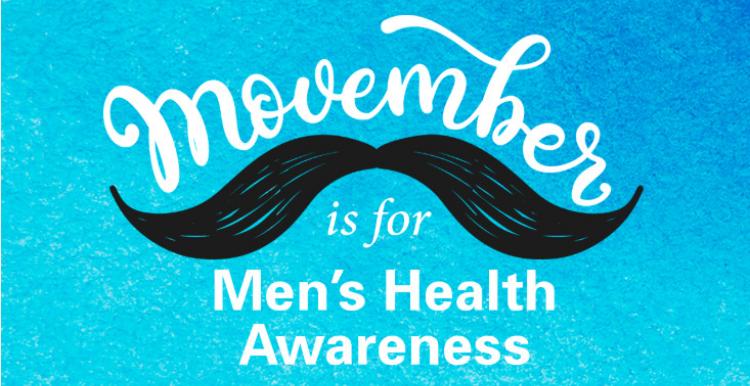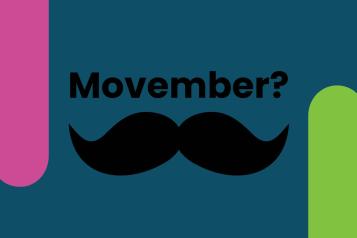Movember - Men's Health Awareness Month!

The information in this article is taken from uk.movember.com.
Mental health
Every minute, somewhere in the world, a man dies by suicide - that's over 510,000 men each year. Men are disproportionately affected by suicide, with three in four suicides being men.
Risk factors that increase someone’s vulnerability to suicide include acute stress, low mood and social isolation along with the belief that they shouldn’t talk openly about how they are feeling.
Spot the signs
Helping a friend who's struggling with his mental health is easy when you know how:
- Ask - start by mentioning anything different you’ve noticed. Maybe he’s spending more time at the bar, coming into work late, or missing social events. Trust your instinct. Remember, we often say “I’m fine” when we’re not. So if you think something’s wrong, don’t be afraid to ask twice.
- Listen - try to give him your full attention, without interruptions. Don’t feel you have to diagnose problems, offer solutions or give advice. Just let him know you’re all ears, judgement-free. Follow-up questions are good too. They’ll help let him know you’re listening.
- Encourage action - help him focus on simple things that might improve his wellbeing: Is he getting enough sleep, exercising regularly, and eating properly? Maybe there’s something that's helped before? Suggest he tells other people he trusts how he's feeling. This will make things easier – for both of you. And if he’s felt low for more than two weeks, suggest he sees his doctor.
- Check-in - suggest you catch up soon in person if you can. If you can’t manage a meet-up, make time for a call, or drop him a message. This will show you care. Plus, you’ll get a feel for whether he’s feeling any better. If you’re worried that somebody’s life is in immediate danger, go directly to emergency services.
Local resources
If you're looking for local services to help you with your mental health, have a read of our list of mental health support contacts.
Prostate cancer
Prostate cancer is the most commonly diagnosed cancer in men in the UK. Globally, more than 1.4 million men are diagnosed with prostate cancer each year.
Only men have a prostate gland. The prostate gland is usually the size and shape of a walnut and grows bigger as you get older. It sits underneath the bladder and surrounds the urethra, which is the tube men urinate and ejaculate through. Its main job is to help make semen – the fluid that carries sperm.
Prostate cancer occurs when some of the cells in the prostate reproduce far more rapidly than normal, resulting in a tumour. Prostate cancer often grows slowly to start with and may never cause any problems. But some men have prostate cancer that is more likely to spread. These prostate cancer cells, if left untreated, may spread from the prostate and invade distant parts of the body, particularly the lymph nodes and bones, producing secondary tumours in a process known as metastasis.
Your risk of developing prostate cancer increases with age, but that doesn’t mean it’s a disease that only affects old men. Prostate cancer is the second most common cancer in men worldwide. Men who are black, and men who have a family history (a brother or father with prostate cancer), are 2.5x more likely to get prostate cancer.
If you’re 50, you should be talking to your doctor about PSA testing. If you’re black, you need to start that conversation at 45. And if you have a brother or father with prostate cancer in their history, do it at 45.
Signs and symptoms of prostate cancer
Not everyone experiences symptoms of prostate cancer. Many times, signs of prostate cancer are first detected by a doctor during a routine check-up.
Some men, however, will experience changes in urinary or sexual function that might indicate the presence of prostate cancer, as well as the following symptoms:
- A need to urinate frequently, especially at night
- Difficulty starting urination or holding back urine
- Weak or interrupted flow of urine
- Painful or burning urination
- Difficulty in having an erection
- Painful ejaculation
- Blood in urine or semen
- Frequent pain or stiffness in the lower back, hips, or upper thighs
Further support
For more information and support, see our article on the facts of prostate cancer.
Testicular cancer
Testicular cancer is the #1 cancer among young men, and yet 62% of those who are most at risk don’t know how to check themselves. The best thing you can do for your testicles is to give them a feel every month or so – get to know what’s normal for you. That way, if anything changes you can act on it.
How to examine yourself
- Start by having a warm, steamy shower - it'll help your testicles relax.
- Roll one testicle between your thumb and finger - check for any changes, or anything painful.
- Do the same for your other testicle.
If something hurts, changes, or doesn't feel right, get it checked by your doctor.
How to stay healthy
Stay connected
Spend time with people who make you feel good. Your mates are important and spending time with them is good for you. Catch up regularly, check in, and make time.
Talk more
You don't need to be an expert and you don't have to be the sole solution. But being there for someone, listening to them and giving your time can be life-saving.
Know the numbers
At 50, talk to your doctor about prostate cancer and whether it's right for you to have a PSA test. If you are of African or Caribbean descent, or have a father or brother with prostate cancer, you should be having this conversation at 45. Know your numbers, know your risk, and talk to your doctor.
Know thy nuts!
Get to know what's normal for your testicles. Give them a check regularly and go to the doctor if something doesn't feel right.
Move more
Add more activity to your day. Do more of what makes you feel good. Take a walking meeting. Park further away from the station. Get off the bus a stop or two earlier. Instead of the lift, take the stairs. Cycle to work instead of driving.
For further support and information, head to the Movember wesbite.

